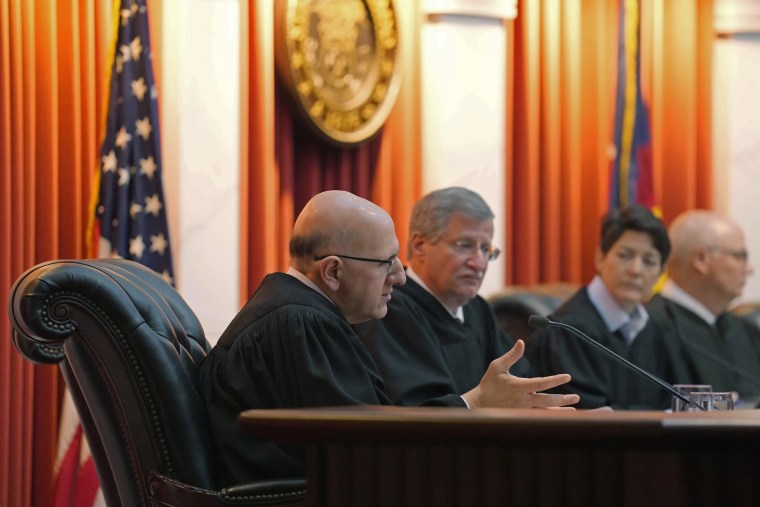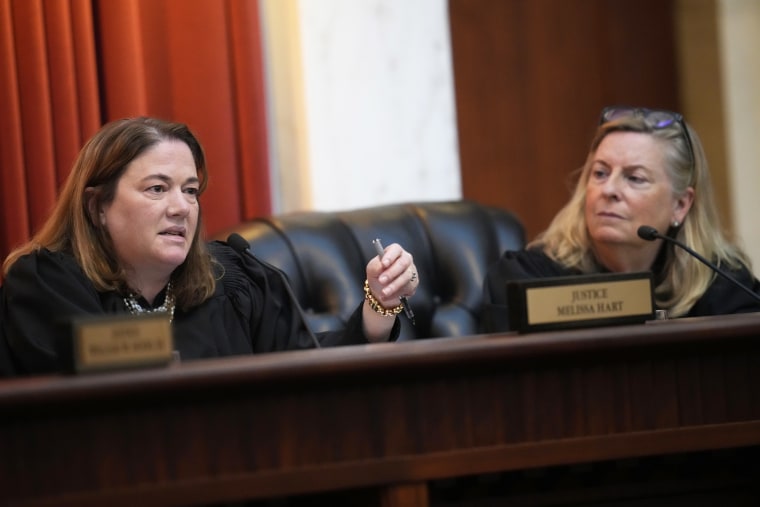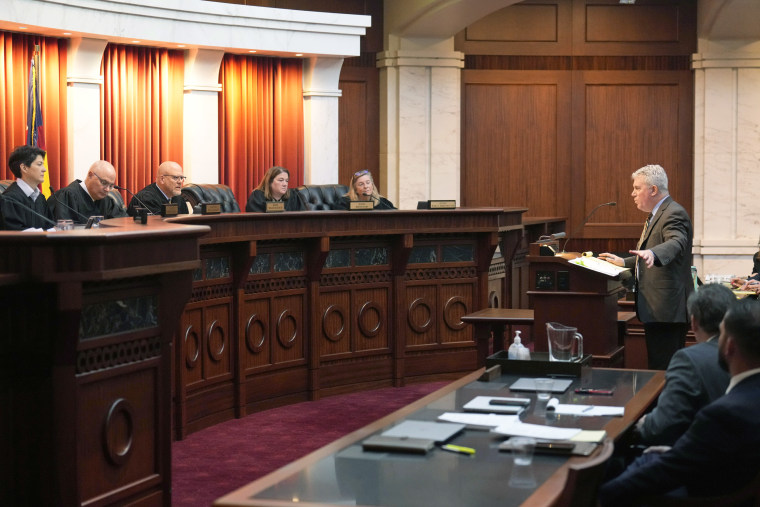The seven-person Colorado Supreme Court, which found in a historic ruling Tuesday that Donald Trump is ineligible to be on the state's primary ballot, is composed entirely of judges appointed by Democrats.
The court's justices weren't unified in the decision; three dissented, arguing that Trump should not be booted from the ballot.
Here's a look at the Colorado court, how its justices are selected and how they ruled in the case.
What kind of cases does the court handle?
The Colorado Supreme Court is the highest court in the state —effectively the last word there on all sorts of cases, including those involving criminal, civil, election and family law.
Appointed by the governor
Justices on the high court are appointed by the governor, and the current slate of justices were all appointed by Democratic governors in the largely blue state, which Joe Biden won by almost 14 points in 2020.
Justice Monica M. Márquez was appointed by then-Gov. Bill Ritter in 2010, and the court's chief justice, Brian D. Boatright, was appointed by then-Gov. John Hickenlooper in 2011. Hickenlooper also appointed four other justices on the current court: William W. Hood III in 2013, Richard L. Gabriel in 2015, Melissa Hart in 2017 and Carlos A. Samour Jr. in 2018.

The state's current governor, Jared Polis, appointed the newest justice, Maria E. Berkenkotter, in 2020. She replaced the resigning Nathan Coats, the last member of the court to be appointed by a Republican governor.
How long do the justices serve?
The justices serve at least two years, and then have to run for retention at the next general election. If successful, they win a 10-year term. All members of the current court have won retention, except Berkenkotter, who has not yet faced a vote. There are no term limits, but there is a mandatory retirement age of 72.
How are the judges selected?
Since 1966, when the state did away with partisan judicial elections, candidates for the high court are recommended by the bipartisan Supreme Court Nominating Commission. "No more than one-half of the commission members plus one, shall be members of the same political party," the court's website says.
Nine of the current 17 members of the commission are Democrats, The Colorado Sun reported.
The commission does a thorough screening of applicants that includes interviews, a questionnaire, a review of cases they've handled, and their political and financial histories, according to the Sun. It then turns over a list of three finalists to the governor, who selects one of those three candidates.

Which justices voted to find Trump ineligible?
The ruling itself is unsigned, but the four justices who agreed Trump was ineligible were Gabriel, Hart, Márquez and Hood.
Who were the dissenting justices?
The justices who disagreed with the decision were Berkenkotter, Samour and Boatright, the chief justice. Boatright's dissent focused on the lack of any criminal conviction against the former president.
“In the absence of an insurrection-related conviction, I would hold that a request to disqualify a candidate under Section Three of the Fourteenth Amendment is not a proper cause of action under Colorado’s election code. Therefore, I would dismiss the claim at issue here,” he wrote.
Political 'hacks'?
The majority ruling has been savaged by Republicans, with Sen. Rick Scott, R-Fla., saying that "in the U.S., we don’t allow political hacks to kick their ‘enemies’ off the ballot," and others accusing the court of being made up of "activist" judges.
The high court has previously sidestepped a politically loaded case. In 2016, it declined to hear the case of a baker who refused to make a wedding cake for a same-sex couple on religious grounds. That decision effectively upheld a lower court ruling that found the baker's refusal was an act of discrimination.
The U.S. Supreme Court then ruled in the baker's favor.
In October, the Colorado Supreme Court agreed to hear a case involving the same baker, who a lower court had found violated a state anti-discrimination law by refusing to make a cake celebrating a gender transition.
In their ruling in the Trump case, the four-judge majority said they were motivated by the law, not politics.
“We do not reach these conclusions lightly. We are mindful of the magnitude and weight of the questions now before us,” the decision said. “We are likewise mindful of our solemn duty to apply the law, without fear or favor, and without being swayed by public reaction to the decisions that the law mandates we reach.”


